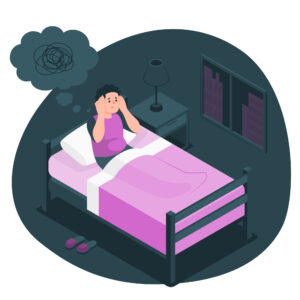Unlocking Mental Well being: The Critical Role of Quality Sleep
In our fast-paced modern lives, sleep often takes a backseat to our busy schedules and endless to-do lists. Yet, its importance cannot be overstated, especially when it comes to mental health. Quality sleep is not just a luxury; it’s a necessity for maintaining overall well-being. In this blog, we’ll delve into the intricate relationship between sleep and mental health, and explore effective strategies for improving sleep quality to enhance mental well-being.
Understanding the Link Between Sleep and Mental Health
The connection between sleep and mental health is profound and bidirectional. Just as poor mental health can lead to sleep disturbances, inadequate sleep can exacerbate existing mental health issues or even contribute to their onset.
- Sleep and Emotional Regulation
Quality sleep plays a crucial role in emotional regulation. When we’re well-rested, our brains are better equipped to manage stress, regulate emotions, and maintain a positive outlook. Conversely, insufficient sleep can heighten emotional reactivity, making us more prone to irritability, mood swings, and anxiety.
- Sleep and Cognitive Function
Sleep is essential for optimal cognitive function. During sleep, the brain consolidates memories, processes information, and rejuvenates neural pathways. Lack of sleep can impair cognitive abilities such as concentration, decision-making, and problem-solving, leading to decreased productivity and impaired performance in daily tasks.
- Sleep and Mental Health Disorders
The relationship between sleep and mental health disorders is complex. Conditions such as depression, anxiety, bipolar disorder, and PTSD are often associated with sleep disturbances, including insomnia, hypersomnia, and disrupted sleep patterns. Addressing sleep issues is an integral part of managing these mental health conditions and promoting recovery.

Effective Strategies for Improving Sleep Quality
Now that we understand the importance of quality sleep for mental well-being, let’s explore some actionable strategies for enhancing sleep quality and promoting better mental health.
- Establish a Consistent Sleep Routine
Consistency is key when it comes to sleep. Aim to go to bed and wake up at the same time every day, even on weekends. This helps regulate your body’s internal clock and promotes better sleep quality over time.
- Create a Relaxing Sleep Environment
Create a conducive sleep environment that promotes relaxation and tranquility. Keep your bedroom cool, dark, and quiet, and invest in a comfortable mattress and pillows. Consider using blackout curtains, white noise machines, or soothing essential oils to enhance relaxation.
- Limit Exposure to Screens Before Bed
The blue light emitted by screens can interfere with your body’s production of melatonin, a hormone that regulates sleep-wake cycles. To promote better sleep, avoid using electronic devices such as smartphones, tablets, and computers at least an hour before bedtime. Instead, engage in relaxing activities such as reading, meditating, or taking a warm bath.
- Practice Stress Reduction Techniques
Chronic stress can disrupt sleep and negatively impact mental health. Incorporate stress reduction techniques into your daily routine, such as deep breathing exercises, mindfulness meditation, progressive muscle relaxation, or yoga. These practices can help calm the mind and promote relaxation before bedtime.
- Limit Caffeine and Alcohol Intake
Caffeine and alcohol can disrupt sleep patterns and interfere with the quality of your rest. Limit your consumption of caffeinated beverages such as coffee, tea, and soda, especially in the afternoon and evening. Similarly, avoid excessive alcohol consumption, as it can disrupt sleep cycles and lead to fragmented sleep.
- Get Regular Exercise
Regular physical activity can promote better sleep quality and enhance overall mental well-being. Aim for at least 30 minutes of moderate exercise most days of the week, but avoid vigorous exercise close to bedtime, as it may interfere with sleep. Outdoor activities, such as walking, jogging, or cycling, can also help regulate your body’s natural sleep-wake cycle.
- Practice Mindful Sleep Hygiene
Mindful sleep hygiene involves adopting healthy habits and behaviors that promote better sleep quality. This includes avoiding large meals, caffeine, and alcohol close to bedtime, as well as creating a relaxing bedtime routine to signal to your body that it’s time to wind down. Incorporate activities such as reading, journaling, or gentle stretching into your evening routine to prepare your mind and body for sleep.
Conclusion
Quality sleep is essential for maintaining optimal mental health and well-being. By prioritizing sleep and implementing effective strategies to improve sleep quality, you can enhance your emotional resilience, cognitive function, and overall quality of life. Remember that sleep is not a luxury; it’s a fundamental pillar of health that deserves our attention and care. By making sleep a priority, you can unlock the full potential of your mind and body, paving the way for a happier, healthier life.

